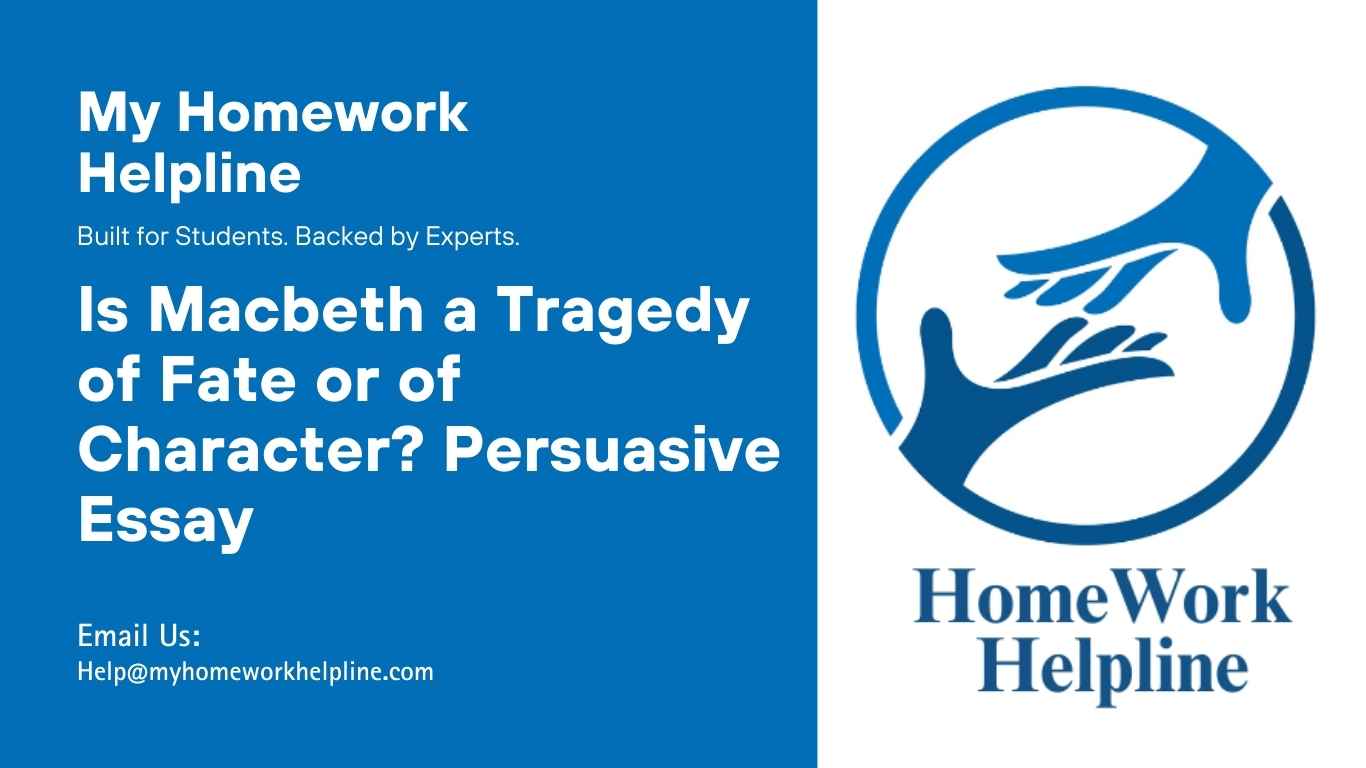Is Macbeth a Tragedy of Fate or of Character? A Persuasive Essay
“Macbeth” by William Shakespeare can be regarded as a tragedy of character since Macbeth eventually falls to his demise due to his ambition, which causes him to be blinded by evil. Character tragedies downplay fate’s influence and emphasize free will and moral responsibility (Magher). The story features a hero attempting to defy fate because the witches predicted that Macbeth would become king but his descendants would not. Shakespeare’s tragic play “Macbeth” wrestles with the choice between fate and free will throughout the entire play. Free will is the capacity to make decisions per one’s interests, whereas fate is a power or force that determines occurrences (Magher). Throughout the play, numerous other characters impact Macbeth’s decisions, which change the course of his destiny.
Need help with literature assignments or persuasive essays like Is Macbeth a tragedy of fate or of character? Our team at English literature homework helpline provides expert guidance on Shakespeare, persuasive essay writing, and character analysis. From coursework to full essays, we deliver plagiarism-free, timely, and professional support, helping you excel academically while deepening your understanding of classic literature. Get reliable homework assistance today.
In a tragedy, the main character achieves greatness before continuing to descend into shame, which ultimately brings about their demise. Macbeth brought about both his terrible fate and the tragedies in his groupmates’ lives as he regressed from being respectable and moral to become insensitive to what is foul and what is fair. Macbeth degenerated into a devil-like figure, from a respectable, moral person to an individual who could not tell good from evil. Macbeth lost interest in the feelings and thoughts of those nearby who had once regarded themselves as this demon’s friends because he was so preoccupied with himself and the visions the three witches had imposed upon him (Magher). This tragedy developed gradually so the reader could get used to the main character’s strength and contentment. Then, suddenly, signals started to emerge, indicating an impending climax as the central character moved closer to his inevitable demise.
The three witches in the play’s opening scene initially captivated Macbeth’s interest in ruling. The witches played a central role in Macbeth’s development into brutal individuals. As they were supernatural beings, their talk was always tinged with a bit of honesty but often with blind optimism. In addition, Shakespeare’s witches applaud Macbeth early on in the play as a prophet who would succeed to the crown. After killing the king and taking control of the Scottish throne, Macbeth realizes they were obliquely prophesying his demise. The witches represent the evil forces that have the power to influence an individual’s judgment and the internal evil that Macbeth exhibits.
In addition to exposing the audience to the supernatural element that will be featured throughout the play, the presence of the witches, the powerful winds, and the barren setting shows a concept of destruction at the beginning of the play of Macbeth (Dellinger). The witches are a metaphor for tragedy’s conflict, confusion, and darkness traits. They grant Macbeth predictions that seem sure to come true but are baseless, and by deceiving and controlling him for their ends, they ruin Macbeth.
Shakespeare uses The Witches’ personas to add a fantasy feature to his tragedy. The Witches represent an essential part of the play because they both foresee Macbeth’s tragedy and serve as omens of what is to show up. The Witches aid in drawing attention to critical scenes in the play where sinister and ominous elements are more prominent than they typically are. The Witches appear to play a significant role in giving the play a gloomy, frightful feel even though Macbeth is a dark tragedy in and of itself. The characteristics of tragedy are confusion, strife, and sadness, which the witches represent.
The Witches intend to reunite, and as they leave, they declare, “Fair is foul, and foul is fair: Hover through the fog and filthy air” (Shakespeare 10). The Witches have already established the mood for the play when the readers learn later that The Witches have power over Macbeth. Shakespeare intends his audience to know that The Witches direct the play and its atmosphere for the remainder of the play. Later, Macbeth tells Banquo he has never witnessed a foul and fair day (Shakespeare 36). Shakespeare gives the impression that The Witches have the power to sway a person before they have even met.
But the Witches’ prophecy made by The Witches initially spurs him to think about using murder to seize the throne. Shakespeare may have sought the audience to believe that The Witches are interfering with the proceedings with their evil abilities, but in reality, Macbeth’s acts bring about The Witches’ prophecies (Magher). The goddess of witchcraft, Hecate, also has an impact on Macbeth. She says she will utilize her magic to conjure manifestations that will move Macbeth toward his doom and that he will visit The Witches to discover his future. After fully fulfilling the Witches’ prophecy, Macbeth’s relationship with these ministers of evil grows ever stronger, bringing Macbeth even nearer to his demise. Lastly, The play concludes with Macbeth’s death and Malcolm, Duncan’s son, being crowned king after he becomes both overconfident and ambitious (Dellinger). Due to his tragedy, Macbeth passes away at the end of the play. Because Macbeth, the tragic hero, exhibits a tragic flaw and experiences a downfall that results in his death, the play is referred to as a tragedy (Dellinger). All the play’s characters are impacted by the selfishness, lies, and deception that results in their demise.
Works Cited
Dellinger, Janine. “Macbeth as a Tragic Hero in Macbeth by William Shakespeare.” Study.com, 20 Apr. 2022, https://study.com/academy/lesson/is-macbeth-a-tragic-hero.html#:~:text=Macbeth%20is%20called%20a%20tragedy,and%20downfall%20of%20multiple%20characters.
Magher, Maria. “Tragedy of Fate Vs. Tragedy of Character.” Pen And the Pad, 5 Nov. 2021, https://penandthepad.com/tragedy-fate-vs-tragedy-character-22248.html
Shakespeare, William. The tragedy of Macbeth. Vol. 2. Classic Books Company, 2001.

